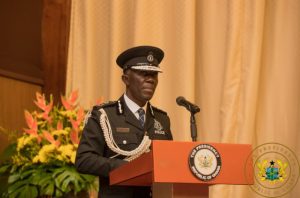Policy think tank, the Alliance for Social Equity and Public Accountability (ASEPA) wants the University of Ghana to reconsider the disciplinary action it has taken against two of its lecturers who were indicted over the BBC’s sex for grades documentary.
ASEPA in a statement argued that the hearing of the case of the two lecturers did not meet local and international arbitration standards.
The two lecturers, Professor Ransford Gyampo and Dr. Paul Butakor have been handed a six months and four months suspension respectively after the school’s disciplinary committee found them guilty of misconduct.
“The preferred punishment for breaching such regulations ordinarily does not include withdrawing of the employee’s basic salary or undergoing positive assessment training or annual assessment before resumption of duty. The University failed to take into accounts the four months period for which the respondents have remained interdicted contrary to the sentencing regime in our justice delivery system.”
“That the sentence of 6 months and 4 months suspension without pay is unlawful contrary to Section 69(2a) of the Labour Act of Ghana, Act 651,” ASEPA noted.
Aside from the suspension, the two are additionally expected to be trained on the University’s sexual misconduct policy after which they will resume their posts based on a “positive assessment”.
They will also be subjected to an annual assessment for a five year period as part of the University’s decision which took effect on January 1, 2020.
Punishment a little too harsh
Although the two lecturers say they accept the punitive measures taken against them, they believe it is too harsh.
A statement issued by lawyers of the lecturers, F-X Law & Associates said, the BBC did “showed gross disrespect” to Prof. Butakor and Prof. Gyampo by not availing themselves to be cross-examined during the University’s administrative proceedings on the matter, insisting that the disciplinary measures taken against the two lecturers do not indicate their guilt in the matter.
“We find the decision to be a little too harsh and the university’s communiqué as misleading. However, our clients accept the said decision and would respect it. Our clients have made it clear to us that as senior members of the University, they do not want to further litigate this matter in court or have a protracted dispute over the issue”, the lawyers said.
ASEPA’s recommendation
ASEPA, therefore, recommended that the University of Ghana takes the following actions to remedy the negative impressions created in the public domain that can ultimately affect the image and reputation of the University.
1. Re-issue a communiqué stating clearly that the University did not find these lecturers guilty of sex for grades but misconduct contrary to the University statutes.
2. Allow the sanctions of the lecturers to take retrospective effect, starting from the day they were interdicted.
3. Restore the basic salaries of these lecturers throughout the remaining period of their sanctions.
4. Withdraw the positive assessment training and annual assessment for the two lecturers (which are usually meant for those found guilty of sex for grades) unless the University wants to provide further basis that indeed these lecturers were found culpable of the said allegations.
Findings of fact-finding committee
The committee set up to investigate the two indicted lecturers established a prima facie case against the embattled faculty members.
In its report, the committee recommended that the matter should be brought before the University of Ghana’s Disciplinary committee for further actions.
The committee which was chaired by Justice Vida Akoto-Bamfo noted that the two lecturers based on initial evidence gathered misconducted themselves in breach of the University of Ghana’s statutes which stipulate that Academic staff are expected to comport themselves in ways that will enhance the image of the University.
The committee also found out that the two embattled lecturers also breached Statute 42(1)( e )(ii) which states that “no member of the University shall engage in a course of vexatious conduct that is directed at one or more specific individuals, and that is known to be unwelcome.”
Source: Citinewsroom.com






